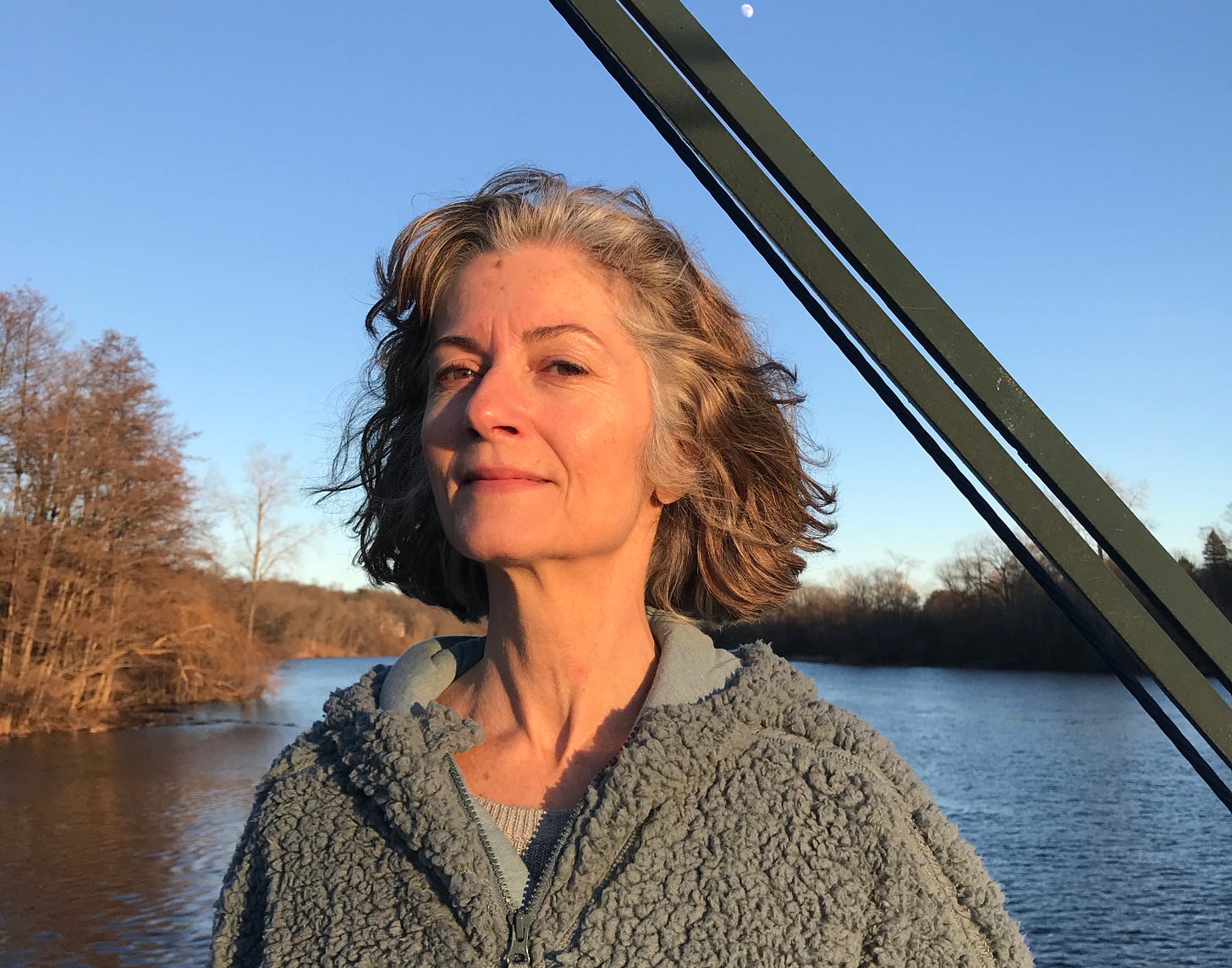Alison Swan on Surviving These Times
In search of what can't be found online
Alison Swan and I met way back in the day. We somehow ended up in the same writer’s workshop during the year I moved back to Michigan after my divorce and Alison had just graduated from the University of Michigan’s MFA Writing Program and was working at Ann Arbor’s legendary Shaman Drum Bookshop. We got on instantly and have stayed loosely in each other’s lives ever since.
One of the things I love and admire about Alison is how much Alison loves and admires our planet. She advocates for it both through her writing and lived action. She has written or edited several eco-themed books including A Fine Canopy which was shortlisted for an IPPY Poetry Medal from Independent Publisher, listed as one of the eleven most anticipated poetry books of fall 2020 by LitHub, and highly recommended by Orion magazine where she has a new poem forthcoming. She also leads the Eco Book Club at Literati Bookstore and taught eco-literature at Western Michigan University for many years. And she’s been active in efforts to protect and preserve the Saugatuck Dunes on the southeastern shore of Lake Michigan since 2001.
On top of all that, her poetry is simply glorious! Lucky for us, Alison agreed to read the four poems included in this week’s newsletter. When Alison reads her work, I feel it in my bones! I think you will, too!
Alison shared of her work: “When I wrote No. 1—on the first full moon after the election of 2016—I thought I might be writing them at a rapid rate, which hasn't happened. In fact, these days I'm making peace with the incredibly slow rate at which I work, very slow and very steady. On my best days, this feels like resistance.”
Antivenin No. 1 A Fine Canopy (Detroit: Wayne State U P, 2020) I can stare the moon full in the face all night long if I want to Maybe I will Antivenin No.2 North American Review Nimbly, deer part the dark and slow traffic. Night interrupts the long view, wilderness I consider carrying inside then leave to the does, those heroic mothers. One way to survive our story is to take a page from theirs. Cover less ground, I mean. Let every single picket have its moment, meander the flowerbed weed to weed, read as many stems as you can. Nose the mushrooms. Leap to the other side. Antivenin No. 3 Split Rock Review She is not the first to say: Tunnel of Trees, place without sun or with little, where trees meet gravity with something akin to surrender. Call it bowing though you know it’s not. Call it commonplace as soil once was and is no longer. Call it commonplace as heedlessness. Don’t bring up sex, religion, politics, nor weather either anymore. That’s just the way it goes. Imagine that, she used to say, her hair a perfectly flattering cut and color, and why not? It saved her from criticism in her own home. Women do what we must to deflect his gaze, to be free to cast our own upon snow or not-snow, soil or not-soil. Compost I write and think compose. Compose I write and think compute, measure all the microbes left at the base of this tree where snow piles up then melts, piles up then melts, all winter long: muddy days and icy nights and rarely the clean bright purchase of fresh snow. Birds still sing. They sing out of sight, but they still sing: dozens congregate in one bare tree. I count six species before they begin to notice me and hide—not fly, hide, for old maple is a host of baffles and human is grounded, bowing down you might say. Antivenin No.4 After Roman Loranc’s photograph “Canal, Hedgerow Farm, Yolo County, 1999” A canal’s been cut into fields turned to meadows where some trees have grown up into a felted sky. The clouds recall a stretch of logged central Michigan, circa 1975, year of my last piano lesson. But it’s Yolo County, California, in the year of the birth of my daughter. The water’s surface is blank as brand new skin become silver triangle pointed at a live oak teeming with little lives, the ones that inhabit bark crevices, the undersides of leaves, and water. A fish or something has lined the surface. A man with a camera has waited and as he waited, felt the ripening seeds of bountiful herbs and grasses. You can feel such a thing for decades without knowing that you’re feeling it. And then the book gets opened and placed upon the piano which I had better begin to play again.
Thank you for being here, dear Beyonders! ❤️ Your comments (and hearts) mean so much to me. I read each and every one.








Wow. Gorgeous imagery. Thank you for this, Jane! I’m going to look for more of Alison Swan’s verse. What a wonderful introduction.
This is beautiful. Thank you.